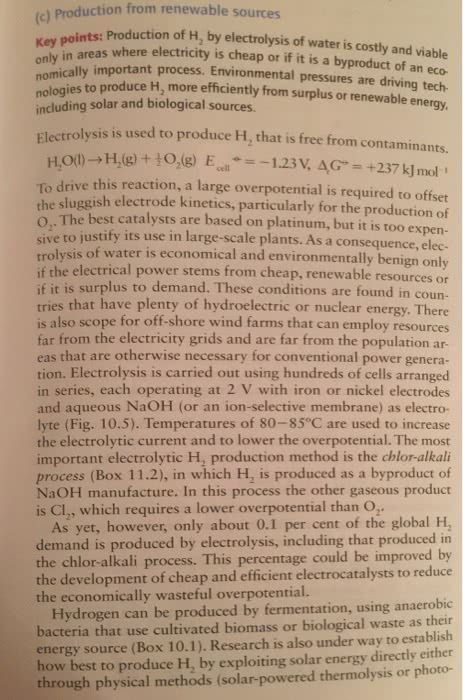CHEM 126 Lecture Notes - Lecture 11: Stoichiometry, Ideal Gas Law, Strong Electrolyte
43 views2 pages
9 Aug 2020
School
Department
Course
Professor
Document Summary
Electrolysis of pure water requires excess energy in the form of overpotential to overcome various activation barriers. Without the excess energy the electrolysis of pure water occurs very slowly or not at all. This is in part due to the limited self-ionization of water. Pure water has an electrical conductivity about one millionth that of seawater: for example, a solution conducts current when positive and negative ions are randomly dissolved in it. Pure water doesn"t have enough ions but when you add an acid like hcl there is now a presence of a strong electrolyte. After the addition, the solution can conduct electricity very well. However, you can perform an electrolysis even without the acid, but this is a very slow process. Since there are positive and negatives ions and this will cause one to think that the pure water will conduct a current.
Get access
Grade+20% off
$8 USD/m$10 USD/m
Billed $96 USD annually

Homework Help
Study Guides
Textbook Solutions
Class Notes
Textbook Notes
Booster Class
40 Verified Answers
Class+
$8 USD/m
Billed $96 USD annually

Homework Help
Study Guides
Textbook Solutions
Class Notes
Textbook Notes
Booster Class
30 Verified Answers
Related textbook solutions
Chemistry: Structure and Properties
2 Edition,
Tro
ISBN: 9780134293936
Basic Chemistry
5 Edition,
Timberlake
ISBN: 9780134138046
Principles of Chemistry Molecular Approach
4th Edition,
Tro
ISBN: 9780134112831
Principles of Chemistry Molecular Approach
3rd Edition, 2014
Tro
ISBN: 9780321971944
Chemistry: Structure and Properties
2nd Edition,
Tro
ISBN: 9780134293936
Chemistry: A Molecular Approach
3rd Edition,
Tro
ISBN: 9780321809247
Chemistry: A Molecular Approach
5th Edition,
Tro
ISBN: 9780134874371
Principles of Chemistry: A Molecular Approach
4th Edition,
Tro
ISBN: 9780134895741
Chemistry: The Central Science
14th Edition, 2017
Brown
ISBN: 9780134414232
